| Listing 1 - 8 of 8 |
Sort by
|
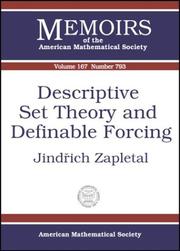
ISBN: 0821834509 Year: 2004 Publisher: Providence, Rhode Island : American Mathematical Society,
Abstract | Keywords | Export | Availability | Bookmark
 Loading...
Loading...Choose an application
- Reference Manager
- EndNote
- RefWorks (Direct export to RefWorks)
Mathematical logic --- 510.2 --- Foundations of mathematics --- 510.2 Foundations of mathematics --- Descriptive set theory. --- Forcing (Model theory) --- Continuum hypothesis --- Borel sets. --- Borel sets --- Descriptive set theory --- Model theory --- Set theory --- Generalized continuum hypothesis --- Hypothesis, Continuum --- Hypothesis, Generalized continuum --- B-measurable sets --- B-sets --- Borel-measurable sets --- Borel subsets --- Borelian sets --- Subsets, Borel --- Analytic sets --- Topology
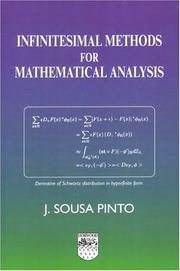
ISBN: 1898563993 0857099507 9780857099501 9781898563990 Year: 2004 Publisher: Chichester, West Sussex
Abstract | Keywords | Export | Availability | Bookmark
 Loading...
Loading...Choose an application
- Reference Manager
- EndNote
- RefWorks (Direct export to RefWorks)
This modern introduction to infinitesimal methods is a translation of the book Métodos Infinitesimais de Análise Matemática by José Sousa Pinto of the University of Aveiro, Portugal and is aimed at final year or graduate level students with a background in calculus. Surveying modern reformulations of the infinitesimal concept with a thoroughly comprehensive exposition of important and influential hyperreal numbers, the book includes previously unpublished material on the development of hyperfinite theory of Schwartz distributions and its application to generalised Fourier transforms and harmon
Calculus. --- Nonstandard mathematical analysis. --- Schwartz distributions. --- Distributions, Schwartz --- Theory of distributions (Functional analysis) --- Analysis (Mathematics) --- Fluxions (Mathematics) --- Infinitesimal calculus --- Limits (Mathematics) --- Mathematical analysis --- Functions --- Geometry, Infinitesimal --- Analysis, Nonstandard mathematical --- Mathematical analysis, Nonstandard --- Non-standard analysis --- Nonstandard analysis --- Model theory
Book
ISBN: 1282607936 9786612607936 1400826187 9781400826186 9781282607934 Year: 2004 Publisher: Princeton, N.J. ; Oxford : Princeton University Press,
Abstract | Keywords | Export | Availability | Bookmark
 Loading...
Loading...Choose an application
- Reference Manager
- EndNote
- RefWorks (Direct export to RefWorks)
Löwenheim's theorem reflects a critical point in the history of mathematical logic, for it marks the birth of model theory--that is, the part of logic that concerns the relationship between formal theories and their models. However, while the original proofs of other, comparably significant theorems are well understood, this is not the case with Löwenheim's theorem. For example, the very result that scholars attribute to Löwenheim today is not the one that Skolem--a logician raised in the algebraic tradition, like Löwenheim--appears to have attributed to him. In The Birth of Model Theory, Calixto Badesa provides both the first sustained, book-length analysis of Löwenheim's proof and a detailed description of the theoretical framework--and, in particular, of the algebraic tradition--that made the theorem possible. Badesa's three main conclusions amount to a completely new interpretation of the proof, one that sharply contradicts the core of modern scholarship on the topic. First, Löwenheim did not use an infinitary language to prove his theorem; second, the functional interpretation of Löwenheim's normal form is anachronistic, and inappropriate for reconstructing the proof; and third, Löwenheim did not aim to prove the theorem's weakest version but the stronger version Skolem attributed to him. This book will be of considerable interest to historians of logic, logicians, philosophers of logic, and philosophers of mathematics.
Logic, Symbolic and mathematical. --- Model theory. --- Logic, Symbolic and mathematical --- Algebra of logic --- Logic, Universal --- Mathematical logic --- Symbolic and mathematical logic --- Symbolic logic --- Mathematics --- Algebra, Abstract --- Metamathematics --- Set theory --- Syllogism --- Löwenheim, Leopold,
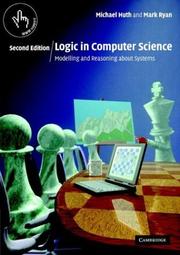
ISBN: 052154310X 9780521543101 Year: 2004 Publisher: Cambridge : Cambridge University Press,
Abstract | Keywords | Export | Availability | Bookmark
 Loading...
Loading...Choose an application
- Reference Manager
- EndNote
- RefWorks (Direct export to RefWorks)
The second edition of this successful textbook continues to provide a clear introduction to formal reasoning relevant to the needs of modern computer science and sufficiently exacting for practical applications. Improvements have been made throughout with many new and expanded text sections. The coverage of model-checking has been substantially updated and additional exercises are included. Internet support includes worked solutions for teacher exercises and model solutions to some student exercises. First Edition Hb (2000): 0-521-65200-6 First Edition Pb (2000): 0-521-65602-8
Computer logic --- Logic programming (Computer science) --- Computer logic. --- Logic programming. --- Logic programming (Computer science). --- Logique informatique --- 681.3*F11 <043> --- Models of computation: automata bounded action devices computability theory relations among models self-modifying machines unbounded-action devices--See also {681.3*F41}--Dissertaties --- 681.3*F11 <043> Models of computation: automata bounded action devices computability theory relations among models self-modifying machines unbounded-action devices--See also {681.3*F41}--Dissertaties --- 681.3*F41 Mathematical logic: computability theory computational logic lambda calculus logic programming mechanical theorem proving model theory proof theoryrecursive function theory--See also {681.3*F11} {681.3*I22} {681.3*I23} --- Mathematical logic: computability theory computational logic lambda calculus logic programming mechanical theorem proving model theory proof theoryrecursive function theory--See also {681.3*F11} {681.3*I22} {681.3*I23} --- 681.3*F11 Models of computation: automata bounded action devices computability theory relations among models self-modifying machines unbounded-action devices--See also {681.3*F41} --- Models of computation: automata bounded action devices computability theory relations among models self-modifying machines unbounded-action devices--See also {681.3*F41} --- computermodel --- 681.3*F41 Mathematical logic: computability theory; computational logic; lambda calculus; logic programming; mechanical theorem proving; model theory; proof theory;recursive function theory--See also {681.3*F11}; {681.3*I22}; {681.3*I23} --- Mathematical logic: computability theory; computational logic; lambda calculus; logic programming; mechanical theorem proving; model theory; proof theory;recursive function theory--See also {681.3*F11}; {681.3*I22}; {681.3*I23} --- 681.3*F11 Models of computation: automata; bounded action devices; computability theory; relations among models; self-modifying machines; unbounded-action devices--See also {681.3*F41} --- Models of computation: automata; bounded action devices; computability theory; relations among models; self-modifying machines; unbounded-action devices--See also {681.3*F41} --- Logic programming --- 681.3*F11 <043> Models of computation: automata; bounded action devices; computability theory; relations among models; self-modifying machines; unbounded-action devices--See also {681.3*F41}--Dissertaties --- Models of computation: automata; bounded action devices; computability theory; relations among models; self-modifying machines; unbounded-action devices--See also {681.3*F41}--Dissertaties --- Computer programming --- Computer science logic --- Logic, Symbolic and mathematical --- 681.3*F11 --- 681.3*F41 --- computerarchitectuur --- kunstmatige intelligentie (artificiële intelligentie) --- Computer science --- Mathematical logic --- Computer programs --- Logiciels --- Verification --- Vérification --- Informatique --- Logique mathématique
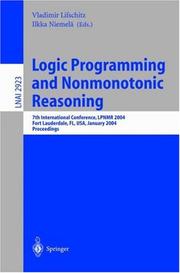
ISBN: 354020721X 9786610307975 3540246096 9783540207214 Year: 2004 Volume: 2923 Publisher: Berlin, Heidelberg : Springer Berlin Heidelberg : Imprint: Springer,
Abstract | Keywords | Export | Availability | Bookmark
 Loading...
Loading...Choose an application
- Reference Manager
- EndNote
- RefWorks (Direct export to RefWorks)
681.3*D16 --- 681.3*F41 --- 681.3*I2 --- 681.3*I23 --- 681.3*I23 Deduction and theorem proving: answer/reason extraction reasoning resolution metatheory mathematical induction logic programming (Artificial intelligence) --- Deduction and theorem proving: answer/reason extraction reasoning resolution metatheory mathematical induction logic programming (Artificial intelligence) --- 681.3*I2 Artificial intelligence. AI --- Artificial intelligence. AI --- 681.3*F41 Mathematical logic: computability theory computational logic lambda calculus logic programming mechanical theorem proving model theory proof theoryrecursive function theory--See also {681.3*F11} {681.3*I22} {681.3*I23} --- Mathematical logic: computability theory computational logic lambda calculus logic programming mechanical theorem proving model theory proof theoryrecursive function theory--See also {681.3*F11} {681.3*I22} {681.3*I23} --- Computerwetenschap--?*D16 --- Logic programming --- Nonmonotonic reasoning --- Non-monotonic reasoning --- Computer science. --- Software engineering. --- Computer programming. --- Mathematical logic. --- Artificial intelligence. --- Computer Science. --- Software Engineering/Programming and Operating Systems. --- Artificial Intelligence (incl. Robotics). --- Programming Techniques. --- Mathematical Logic and Formal Languages. --- AI (Artificial intelligence) --- Artificial thinking --- Electronic brains --- Intellectronics --- Intelligence, Artificial --- Intelligent machines --- Machine intelligence --- Thinking, Artificial --- Bionics --- Cognitive science --- Digital computer simulation --- Electronic data processing --- Logic machines --- Machine theory --- Self-organizing systems --- Simulation methods --- Fifth generation computers --- Neural computers --- Algebra of logic --- Logic, Universal --- Mathematical logic --- Symbolic and mathematical logic --- Symbolic logic --- Mathematics --- Algebra, Abstract --- Metamathematics --- Set theory --- Syllogism --- Computers --- Electronic computer programming --- Electronic digital computers --- Programming (Electronic computers) --- Coding theory --- Computer software engineering --- Engineering --- Informatics --- Science --- Programming --- 681.3*I23 Deduction and theorem proving: answer/reason extraction; reasoning; resolution; metatheory; mathematical induction; logic programming (Artificial intelligence) --- Deduction and theorem proving: answer/reason extraction; reasoning; resolution; metatheory; mathematical induction; logic programming (Artificial intelligence) --- 681.3*F41 Mathematical logic: computability theory; computational logic; lambda calculus; logic programming; mechanical theorem proving; model theory; proof theory;recursive function theory--See also {681.3*F11}; {681.3*I22}; {681.3*I23} --- Mathematical logic: computability theory; computational logic; lambda calculus; logic programming; mechanical theorem proving; model theory; proof theory;recursive function theory--See also {681.3*F11}; {681.3*I22}; {681.3*I23} --- Reasoning --- Artificial Intelligence. --- Logic programming - Congresses --- Nonmonotonic reasoning - Congresses
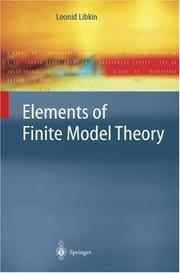
ISBN: 3540212027 3642059481 3662070030 Year: 2004 Publisher: Berlin ; New York : Springer,
Abstract | Keywords | Export | Availability | Bookmark
 Loading...
Loading...Choose an application
- Reference Manager
- EndNote
- RefWorks (Direct export to RefWorks)
This book is an introduction to finite model theory which stresses the computer science origins of the area. In addition to presenting the main techniques for analyzing logics over finite models, the book deals extensively with applications in databases, complexity theory, and formal languages, as well as other branches of computer science. It covers Ehrenfeucht-Fraïssé games, locality-based techniques, complexity analysis of logics, including the basics of descriptive complexity, second-order logic and its fragments, connections with finite automata, fixed point logics, finite variable logics, zero-one laws, and embedded finite models, and gives a brief tour of recently discovered applications of finite model theory. This book can be used both as an introduction to the subject, suitable for a one- or two-semester graduate course, or as reference for researchers who apply techniques from logic in computer science.
Computer science --- Model theory. --- 681.3*F4 --- 681.3*F1 --- 681.3*H2 --- 681.3*F3 --- Logic, Symbolic and mathematical --- Mathematical logic and formal languages (Theory of computation) --- Computation by abstract devices --- Database management: security; integrity; protection--See also {?681.5*E5} --- Logics and meanings of programs (Theory of computation) --- Model theory --- 681.3*F3 Logics and meanings of programs (Theory of computation) --- 681.3*H2 Database management: security; integrity; protection--See also {?681.5*E5} --- 681.3*F1 Computation by abstract devices --- 681.3*F4 Mathematical logic and formal languages (Theory of computation) --- Mathematical logic. --- Computers. --- Algorithms. --- Database management. --- Mathematical Logic and Foundations. --- Mathematical Logic and Formal Languages. --- Computation by Abstract Devices. --- Algorithm Analysis and Problem Complexity. --- Database Management. --- Data base management --- Data services (Database management) --- Database management services --- DBMS (Computer science) --- Generalized data management systems --- Services, Database management --- Systems, Database management --- Systems, Generalized database management --- Electronic data processing --- Algorism --- Algebra --- Arithmetic --- Automatic computers --- Automatic data processors --- Computer hardware --- Computing machines (Computers) --- Electronic brains --- Electronic calculating-machines --- Electronic computers --- Hardware, Computer --- Computer systems --- Cybernetics --- Machine theory --- Calculators --- Cyberspace --- Algebra of logic --- Logic, Universal --- Mathematical logic --- Symbolic and mathematical logic --- Symbolic logic --- Mathematics --- Algebra, Abstract --- Metamathematics --- Set theory --- Syllogism --- Foundations --- Informatique --- Computer science. --- Logique mathématique --- Théorie des modèles
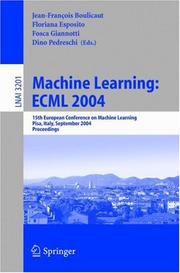
ISBN: 3540231056 3540301151 9783540231059 Year: 2004 Volume: 3201 Publisher: Berlin, Heidelberg : Springer Berlin Heidelberg : Imprint: Springer,
Abstract | Keywords | Export | Availability | Bookmark
 Loading...
Loading...Choose an application
- Reference Manager
- EndNote
- RefWorks (Direct export to RefWorks)
The proceedings of ECML/PKDD 2004 are published in two separate, albeit - tertwined,volumes:theProceedingsofthe 15thEuropeanConferenceonMac- ne Learning (LNAI 3201) and the Proceedings of the 8th European Conferences on Principles and Practice of Knowledge Discovery in Databases (LNAI 3202). The two conferences were co-located in Pisa, Tuscany, Italy during September 20–24, 2004. It was the fourth time in a row that ECML and PKDD were co-located. - ter the successful co-locations in Freiburg (2001), Helsinki (2002), and Cavtat- Dubrovnik (2003), it became clear that researchersstrongly supported the or- nization of a major scienti?c event about machine learning and data mining in Europe. We are happy to provide some statistics about the conferences. 581 di?erent papers were submitted to ECML/PKDD (about a 75% increase over 2003); 280 weresubmittedtoECML2004only,194weresubmittedtoPKDD2004only,and 107weresubmitted to both.Aroundhalfofthe authorsforsubmitted papersare from outside Europe, which is a clear indicator of the increasing attractiveness of ECML/PKDD. The Program Committee members were deeply involved in what turned out to be a highly competitive selection process. We assigned each paper to 3 - viewers, deciding on the appropriate PC for papers submitted to both ECML and PKDD. As a result, ECML PC members reviewed 312 papers and PKDD PC members reviewed 269 papers. We accepted for publication regular papers (45 for ECML 2004 and 39 for PKDD 2004) and short papers that were as- ciated with poster presentations (6 for ECML 2004 and 9 for PKDD 2004). The globalacceptance ratewas14.5%for regular papers(17% if we include the short papers).
681.3*I2 <063> --- 681.3*F22 <063> --- 681.3*F41 <063> --- 681.3*H28 <063> --- 681.3*I2 <063> Artificial intelligence. AI--Congressen --- Artificial intelligence. AI--Congressen --- Nonnumerical algorithms and problems: complexity of proof procedures computations on discrete structures geometrical problems and computations pattern matching --See also {?681.3*E2-5} {681.3*G2} {?681.3*H2-3}--Congressen --- Mathematical logic: computability theory computational logic lambda calculus logic programming mechanical theorem proving model theory proof theoryrecursive function theory--See also {681.3*F11} {681.3*I22} {681.3*I23}--Congressen --- Database applications--Congressen --- Machine learning --- Computer science. --- Algorithms. --- Mathematical logic. --- Database management. --- Artificial intelligence. --- Computer Science. --- Artificial Intelligence (incl. Robotics). --- Algorithm Analysis and Problem Complexity. --- Mathematical Logic and Formal Languages. --- Database Management. --- AI (Artificial intelligence) --- Artificial thinking --- Electronic brains --- Intellectronics --- Intelligence, Artificial --- Intelligent machines --- Machine intelligence --- Thinking, Artificial --- Bionics --- Cognitive science --- Digital computer simulation --- Electronic data processing --- Logic machines --- Machine theory --- Self-organizing systems --- Simulation methods --- Fifth generation computers --- Neural computers --- Data base management --- Data services (Database management) --- Database management services --- DBMS (Computer science) --- Generalized data management systems --- Services, Database management --- Systems, Database management --- Systems, Generalized database management --- Algebra of logic --- Logic, Universal --- Mathematical logic --- Symbolic and mathematical logic --- Symbolic logic --- Mathematics --- Algebra, Abstract --- Metamathematics --- Set theory --- Syllogism --- Algorism --- Algebra --- Arithmetic --- Informatics --- Science --- Foundations --- Nonnumerical algorithms and problems: complexity of proof procedures; computations on discrete structures; geometrical problems and computations; pattern matching --See also {?681.3*E2-5}; {681.3*G2}; {?681.3*H2-3}--Congressen --- Mathematical logic: computability theory; computational logic; lambda calculus; logic programming; mechanical theorem proving; model theory; proof theory;recursive function theory--See also {681.3*F11}; {681.3*I22}; {681.3*I23}--Congressen --- Computer software. --- Artificial Intelligence. --- Software, Computer --- Computer systems --- Machine learning - Congresses
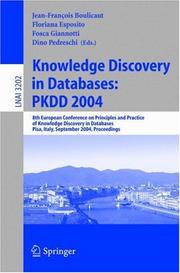
ISBN: 3540231080 354030116X Year: 2004 Publisher: Berlin, Heidelberg : Springer Berlin Heidelberg : Imprint: Springer,
Abstract | Keywords | Export | Availability | Bookmark
 Loading...
Loading...Choose an application
- Reference Manager
- EndNote
- RefWorks (Direct export to RefWorks)
The proceedings of ECML/PKDD 2004 are published in two separate, albeit - tertwined,volumes:theProceedingsofthe 15thEuropeanConferenceonMac- ne Learning (LNAI 3201) and the Proceedings of the 8th European Conferences on Principles and Practice of Knowledge Discovery in Databases (LNAI 3202). The two conferences were co-located in Pisa, Tuscany, Italy during September 20–24, 2004. It was the fourth time in a row that ECML and PKDD were co-located. - ter the successful co-locations in Freiburg (2001), Helsinki (2002), and Cavtat- Dubrovnik (2003), it became clear that researchersstrongly supported the or- nization of a major scienti?c event about machine learning and data mining in Europe. We are happy to provide some statistics about the conferences. 581 di?erent papers were submitted to ECML/PKDD (about a 75% increase over 2003); 280 weresubmittedtoECML2004only,194weresubmittedtoPKDD2004only,and 107weresubmitted to both.Aroundhalfofthe authorsforsubmitted papersare from outside Europe, which is a clear indicator of the increasing attractiveness of ECML/PKDD. The Program Committee members were deeply involved in what turned out to be a highly competitive selection process. We assigned each paper to 3 - viewers, deciding on the appropriate PC for papers submitted to both ECML and PKDD. As a result, ECML PC members reviewed 312 papers and PKDD PC members reviewed 269 papers. We accepted for publication regular papers (45 for ECML 2004 and 39 for PKDD 2004) and short papers that were as- ciated with poster presentations (6 for ECML 2004 and 9 for PKDD 2004). The globalacceptance ratewas14.5%for regular papers(17% if we include the short papers).
681.3*I26 <063> --- 681.3*H2 <063> --- 681.3*J2 <063> --- 681.3*H3 <063> --- 681.3*G3 <063> --- 681.3*I7 <063> --- 681.3*F42 <063> --- 681.3*F41 <063> --- 681.3*J2 <063> Physical sciences and engineering (Computer applications)--Congressen --- Physical sciences and engineering (Computer applications)--Congressen --- 681.3*I26 <063> Learning: analogies concept learning induction knowledge acquisition language acquisition parameter learning (Artificial intelligence)--See also {681.3*K32}--Congressen --- Learning: analogies concept learning induction knowledge acquisition language acquisition parameter learning (Artificial intelligence)--See also {681.3*K32}--Congressen --- Database management: security integrity protection--See also {?681.5*E5}--Congressen --- Information storage and retrieval--Congressen --- Probability and statistics: probabilistic algorithms (including Monte Carlo)random number generation statistical computing statistical software (Mathematics of computing)--Congressen --- Text processing (Computing methodologies)--See also {681.3*H4}--Congressen --- Grammars and other rewriting systems: decision problems grammar types parallel rewriting systems parsing thue systems (Mathematical logic and formal languages)--See also {681.3*D31}--Congressen --- Mathematical logic: computability theory computational logic lambda calculus logic programming mechanical theorem proving model theory proof theoryrecursive function theory--See also {681.3*F11} {681.3*I22} {681.3*I23}--Congressen --- Data mining --- Database searching --- Text processing (Computer science. --- Document Preparation and Text Processing. --- Computer science. --- Data structures (Computer science). --- Mathematical statistics. --- Database management. --- Information storage and retrieval. --- Artificial intelligence. --- Text processing (Computer science). --- Computer Science. --- Artificial Intelligence (incl. Robotics). --- Data Structures, Cryptology and Information Theory. --- Database Management. --- Information Storage and Retrieval. --- Probability and Statistics in Computer Science. --- Processing, Text (Computer science) --- Database management --- Electronic data processing --- Information storage and retrieval systems --- Word processing --- AI (Artificial intelligence) --- Artificial thinking --- Electronic brains --- Intellectronics --- Intelligence, Artificial --- Intelligent machines --- Machine intelligence --- Thinking, Artificial --- Bionics --- Cognitive science --- Digital computer simulation --- Logic machines --- Machine theory --- Self-organizing systems --- Simulation methods --- Fifth generation computers --- Neural computers --- Data base management --- Data services (Database management) --- Database management services --- DBMS (Computer science) --- Generalized data management systems --- Services, Database management --- Systems, Database management --- Systems, Generalized database management --- Mathematics --- Statistical inference --- Statistics, Mathematical --- Statistics --- Probabilities --- Sampling (Statistics) --- Information structures (Computer science) --- Structures, Data (Computer science) --- Structures, Information (Computer science) --- File organization (Computer science) --- Abstract data types (Computer science) --- Informatics --- Science --- Statistical methods --- 681.3*I26 <063> Learning: analogies; concept learning; induction; knowledge acquisition; language acquisition; parameter learning (Artificial intelligence)--See also {681.3*K32}--Congressen --- Learning: analogies; concept learning; induction; knowledge acquisition; language acquisition; parameter learning (Artificial intelligence)--See also {681.3*K32}--Congressen --- Mathematical logic: computability theory; computational logic; lambda calculus; logic programming; mechanical theorem proving; model theory; proof theory;recursive function theory--See also {681.3*F11}; {681.3*I22}; {681.3*I23}--Congressen --- Grammars and other rewriting systems: decision problems; grammar types; parallel rewriting systems; parsing; thue systems (Mathematical logic and formal languages)--See also {681.3*D31}--Congressen --- Probability and statistics: probabilistic algorithms (including Monte Carlo);random number generation; statistical computing; statistical software (Mathematics of computing)--Congressen --- Database management: security; integrity; protection--See also {?681.5*E5}--Congressen --- Data structures (Computer scienc. --- Information storage and retrieva. --- Natural language processing (Computer science). --- Artificial Intelligence. --- Data Structures and Information Theory. --- Natural Language Processing (NLP). --- Information storage and retrieval systems. --- NLP (Computer science) --- Artificial intelligence --- Human-computer interaction --- Semantic computing
| Listing 1 - 8 of 8 |
Sort by
|

 Search
Search Feedback
Feedback About
About Help
Help News
News